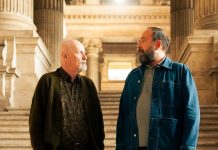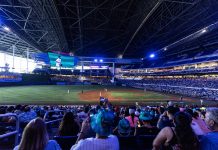
As the world begins to settle into a new normal, many industries are attempting to navigate operations amid health concerns and social-distancing guidelines. One such sector is the arts. When the coronavirus pandemic first took hold in March, Broward County organizations were forced to temporarily close and postpone or cancel concerts, productions, and events. In addition to embracing online content, most are still searching for long-term solutions for returning to in-person programming.

Phillip Dunlap, director of the Broward Cultural Division, notes that no one was truly prepared for a crisis of this magnitude and the resultant loss in revenue. “Nonprofit arts organizations exist on such shoestring budgets; most don’t have more than two months’ operating reserves and some probably less than two weeks,” he says. “When you exist hand-to-mouth then any disruption to your revenue stream is just going to blindside you. And that’s the same for individual artists as well.”
The Broward Cultural Division, which serves as the county’s dedicated arts agency, exists to advocate for, nurture, and invest in culture. In the wake of COVID-19, the division has been focusing on communication, promotion, and funding efforts to “ensure there is an arts community on the other side of this,” says Dunlap.

At artscalendar.com/covid, the division has been sharing government updates, compiling resources, and organizing a virtual events calendar. In the spring, it introduced the Broward Arts Relief grant to help preserve arts jobs in Broward County through one-time grants to eligible organizations.
Institutions have also looked to the division for guidance on how to reopen, though Dunlap stresses that there’s no one-size-fits-all answer. While some smaller orgs might be able to operate at reduced capacities, that might not be fiscally feasible for larger venues. One thing is for certain: When organizations fully return—and the timelines will vary—there will be plenty of changes.

“We’re going to see arts programming, but it’s going to look very different from what we’re used to, not only in the types of things that are programmed, but also the spaces,” Dunlap explains. Museums, for instance, might introduce staggered admittance times to control crowd sizes. Theater companies might mount productions with smaller casts that don’t require physical interaction between characters. Orchestras might opt for outdoor concerts, spacing musicians six feet apart and providing them with individual music stands.
In the interim, arts patrons with the ability to do so should consider donating to help

institutions weather this storm. This can be done through one-time donations, by gifting the price of a canceled event or gala, or even by purchasing memberships. Organizations such as ArtServe and the South Florida Theatre League have also set up funds to directly benefit area artists.
While monetary investments—from private citizens, corporations, and the county government—are key puzzle pieces, the other major factor will be patience. “At some point, we’re going to have to start going out and being comfortable in public spaces again,” says Dunlap, “but we’ve got to ease ourselves into it.” He encourages anyone concerned with attending a specific event to reach out to the presenter to learn about what safety measures have been put into place. “Make the call, talk to people. But we’ll get through this. There’s light at the end of the tunnel—and the arts will be here waiting for everyone.”
Going Virtual
 As part of the immediate aftermath of the pandemic, most Broward County cultural organizations turned to online programming in some capacity. “A lot of what’s happened is the natural inclination of what the arts community does on a regular basis; we’re responsive,” says Phillip Dunlap of the Broward Cultural Division. “[These are] very passionate people, so having them close their doors and just sit and wait for something to happen is not in their nature.”
As part of the immediate aftermath of the pandemic, most Broward County cultural organizations turned to online programming in some capacity. “A lot of what’s happened is the natural inclination of what the arts community does on a regular basis; we’re responsive,” says Phillip Dunlap of the Broward Cultural Division. “[These are] very passionate people, so having them close their doors and just sit and wait for something to happen is not in their nature.”
He points to Florida Children’s Theatre, which moved its classes to Zoom; the Stranahan House, which hosted live educational programming every weekday; the NSU Art Museum Fort Lauderdale, which started offering virtual exhibition tours and compiled an array of at-home art activities; and the Museum of Discovery and Science, which created STEM videos that are free to view on YouTube.

Many large presenting venues also went virtual. The Broward Center for the Performing Arts introduced social media programming including Classes to Go and Broadway Chats with professional performers. The BB&T Center started a #FromYourCouch blog series to share curated music videos, interviews, and even recipes from its kitchen. To learn more about these organizations’ most up-to-date digital initiatives, visit their websites and social media channels.
Calendar Callout
As of press time, the following major events have been rescheduled. Consult individual websites for the latest updates.
• Greater Fort Lauderdale Food & Wine Festival: Rescheduled for August 5-9, with events taking place at Sistrunk Marketplace, the Atlantic Hotel & Spa, and ArtsPark Hollywood
• Feeding South Florida annual outrun hunger 5K: Rescheduled for September 26, at Charnow Park, Hollywood
• Tortuga Music Festival: Rescheduled for October 2-4, with headliners Luke Bryan, Miranda Lambert, and Tim McGraw










Facebook Comments